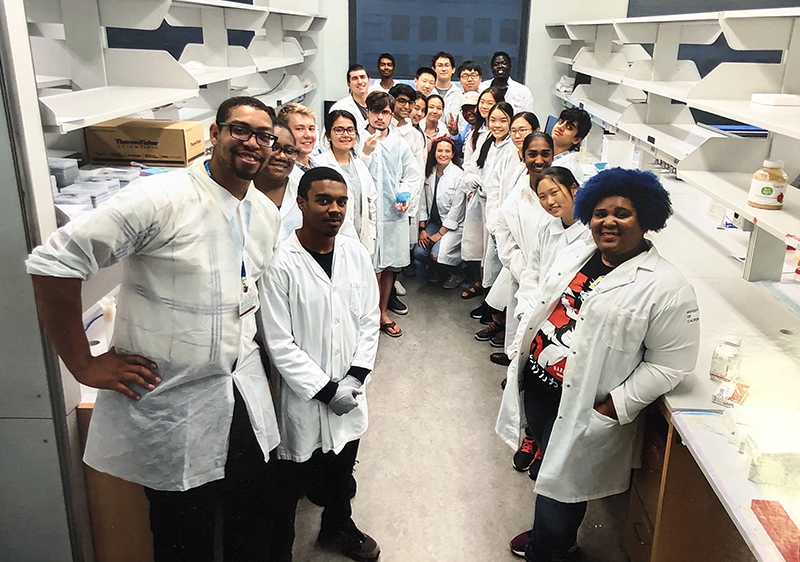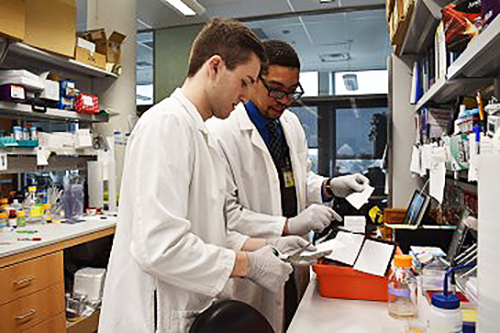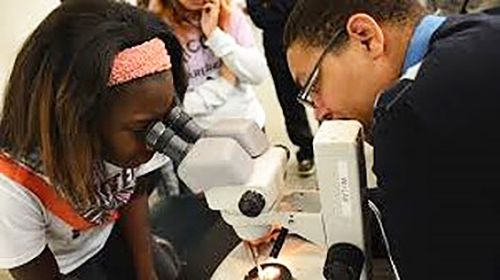Teaching Philosophy
 The operative terms in any teaching philosophy are student learning and practical instruction. While this is true for the Hinton lab, our teaching philosophy has grown and transitioned from the “typical” model of presenting students with basic facts and developing an assessment that measures their retention. We view such teaching as counterintuitive to deeper understanding. As such, there is an emphasis on a Socratic teaching style that embraces constructivist principles and metacognition for greater student accountability. Avoiding rote memorization by students in teaching and fostering an attitude of critical analysis is instead the lab’s primary goal in teaching.
The operative terms in any teaching philosophy are student learning and practical instruction. While this is true for the Hinton lab, our teaching philosophy has grown and transitioned from the “typical” model of presenting students with basic facts and developing an assessment that measures their retention. We view such teaching as counterintuitive to deeper understanding. As such, there is an emphasis on a Socratic teaching style that embraces constructivist principles and metacognition for greater student accountability. Avoiding rote memorization by students in teaching and fostering an attitude of critical analysis is instead the lab’s primary goal in teaching.
 This method encourages students to identify the next steps in a “scenario” in an interactive way, much like a detective story. Lab members are challenged to solve real-world questions in the laboratory by solving a semester-long research problem related to diabetes and hypertension. Lab members are also challenged to combine cell biological and biochemical approaches to delineate the mechanisms of insulin action in insulin-sensitive tissues, such as the brain, heart, and skeletal muscle. As lab members understand the full scope of what they can achieve, they begin to discover and recognize their strengths and weaknesses and develop the confidence to overcome deficiencies. When mentees are appropriately challenged, they will improve their communication skills, demonstrate enhanced retention, and understand the relevance of biology to their lives. As mentors, it is our job to instill and refine expectations of mentees, recognizing differences in learning styles and individual differences. Through improvisation, every lab member is taught and supported differently.
This method encourages students to identify the next steps in a “scenario” in an interactive way, much like a detective story. Lab members are challenged to solve real-world questions in the laboratory by solving a semester-long research problem related to diabetes and hypertension. Lab members are also challenged to combine cell biological and biochemical approaches to delineate the mechanisms of insulin action in insulin-sensitive tissues, such as the brain, heart, and skeletal muscle. As lab members understand the full scope of what they can achieve, they begin to discover and recognize their strengths and weaknesses and develop the confidence to overcome deficiencies. When mentees are appropriately challenged, they will improve their communication skills, demonstrate enhanced retention, and understand the relevance of biology to their lives. As mentors, it is our job to instill and refine expectations of mentees, recognizing differences in learning styles and individual differences. Through improvisation, every lab member is taught and supported differently.
 In the end, learning is more frequently achieved when teachers can model various problem-solving strategies that span the basic concepts to highly sophisticated technologies used as tools to generate experimental and clinical results. This lab believes that teaching and mentoring go hand in hand. To this end, experiences in our laboratory promote a mentee’s ability to identify questions and concepts that guide scientific inquiry. Personal growth through understanding one’s own learning style, biases, strengths, and weakness is required to become an effective learner in this lab. This approach is complemented by a Socratic teaching style that seeks to contextualize the importance of science, instill a drive for excellence, and inculcate a life-long method of learning that de-emphasizes simple memorization.
In the end, learning is more frequently achieved when teachers can model various problem-solving strategies that span the basic concepts to highly sophisticated technologies used as tools to generate experimental and clinical results. This lab believes that teaching and mentoring go hand in hand. To this end, experiences in our laboratory promote a mentee’s ability to identify questions and concepts that guide scientific inquiry. Personal growth through understanding one’s own learning style, biases, strengths, and weakness is required to become an effective learner in this lab. This approach is complemented by a Socratic teaching style that seeks to contextualize the importance of science, instill a drive for excellence, and inculcate a life-long method of learning that de-emphasizes simple memorization.